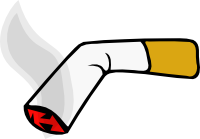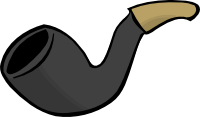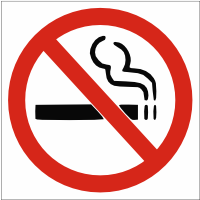Associations to the word «Smoke»
Noun
Adjective
Pictures for the word «Smoke»
Wiktionary
SMOKE, noun. (uncountable) The visible vapor/vapour, gases, and fine particles given off by burning or smoldering material.
SMOKE, noun. (colloquial) (countable) A cigarette.
SMOKE, noun. (colloquial) (countable) (never plural) An instance of smoking a cigarette, cigar, etc.; the duration of this act.
SMOKE, noun. (uncountable) (figuratively) A fleeting illusion; something insubstantial, evanescent, unreal, transitory, or without result.
SMOKE, noun. (uncountable) (figuratively) Something used to obscure or conceal; an obscuring condition; see also smoke and mirrors.
SMOKE, noun. (uncountable) A light grey colour/color tinted with blue.
SMOKE, noun. (military) (uncountable) A particulate of solid or liquid particles dispersed into the air on the battlefield to degrade enemy ground or for aerial observation. Smoke has many uses--screening smoke, signaling smoke, smoke curtain, smoke haze, and smoke deception. Thus it is an artificial aerosol.
SMOKE, noun. (baseball) (slang) A fastball.
SMOKE, verb. (transitive) To inhale and exhale the smoke from a burning cigarette, cigar, pipe, etc.
SMOKE, verb. (intransitive) To inhale and exhale tobacco smoke regularly or habitually.
SMOKE, verb. (intransitive) To give off smoke.
SMOKE, verb. To preserve or prepare (food) for consumption by treating with smoke.
SMOKE, verb. (slang) To perform (e.g. music) energetically or skillfully. Almost always in present participle form.
SMOKE, verb. (US) (slang) To kill, especially with a gun.
SMOKE, verb. (NZ) (slang) To beat someone at something.
SMOKE, verb. (transitive) (obsolete) To fill or scent with smoke; hence, to fill with incense; to perfume.
SMOKE, verb. (obsolete) (transitive) To smell out; to hunt out; to find out; to detect.
SMOKE, verb. (slang) (obsolete) (transitive) To ridicule to the face; to quiz.
SMOKE, verb. To burn; to be kindled; to rage.
SMOKE, verb. To raise a dust or smoke by rapid motion.
SMOKE, verb. To suffer severely; to be punished.
SMOKE, adjective. Of the colour known as smoke.
SMOKE, adjective. Made of or with smoke.
SMOKE, proper noun. (British) (slang) (with "the") London.
SMOKE ALARM, noun. A smoke detector
SMOKE ALARMS, noun. Plural of smoke alarm
SMOKE AND MIRRORS, noun. (idiomatic) A deceptive, fraudulent, or unconvincing explanation or description.
SMOKE ARCH, noun. The smokebox of a locomotive.
SMOKE BLACK, noun. (obsolete) lampblack
SMOKE BOARD, noun. A board suspended before a fireplace to prevent the smoke from coming out into the room.
SMOKE DETECTOR, noun. A device that sounds an alarm when it detects smoke.
SMOKE DETECTORS, noun. Plural of smoke detector
SMOKE DOPE, verb. To smoke an illicit, intoxicating drug, especially marijuana.
SMOKE DOPE, verb. (figuratively) To engage in fanciful reverie or wishful thinking.
SMOKE EATER, noun. (slang) A firefighter.
SMOKE EATER, noun. A device or piece of equipment designed to remove smoke from the air.
SMOKE EATERS, noun. Plural of smoke eater
SMOKE EXPLOSION, noun. (firefighting) An explosion of flue gases accumulated inside a burning building.
SMOKE EXPLOSIONS, noun. Plural of smoke explosion
SMOKE GRENADE, noun. A bomb that generates thick smoke when it explodes; used especially to produce a smokescreen
SMOKE HOOD, noun. A protective device to prevent smoke inhalation, consisting of a translucent airtight bag that is sealed around a person's head while an air filter held in the mouth is used to breathe.
SMOKE HOODS, noun. Plural of smoke hood
SMOKE JUMPER, noun. (US) (Canada) A firefighter trained and equipped to parachute into wildfire zones in remote areas to set up firebreaks.
SMOKE JUMPERS, noun. Plural of smoke jumper
SMOKE LIKE A CHIMNEY, verb. (idiomatic) (simile) To smoke tobacco frequently.
SMOKE OUT, verb. (idiomatic) to drive out (something or somebody) using smoke.
SMOKE OUT, verb. (idiomatic) to expose (something or somebody).
SMOKE POINT, noun. (cooking) The temperature at which an oil or shortening begins to produce smoke. Oils with a high smoke point are suitable for frying in; attempting to fry in a low smoke point oil would be a fire hazard and result in offensive tastes and odors in addition to making the air unbreathable.
SMOKE POINTS, noun. Plural of smoke point
SMOKE POLE, noun. The central, vertical pole of a teepee.
SMOKE POLE, noun. A ridgepole.
SMOKE POLE, noun. (slang) A firearm.
SMOKE POLE, noun. A long stick or pole with a burning tip, used to repel insects.
SMOKE POLE, verb. (idiomatic) To perform fellatio
SMOKE POLES, noun. Plural of smoke pole
SMOKE RING, noun. A smoking trick where one blows or exhales rings of smoke.
SMOKE SAIL, noun. A small sail in the lee of the galley stovepipe, to prevent the smoke from annoying people on deck.
SMOKE SCREEN, noun. Alternative form of smokescreen
SMOKE SIGNAL, noun. (often pluralized) A method of long-distance communication sometimes used in ancient and undeveloped societies, consisting of messages conveyed by means of columns or intermittent puffs of smoke.
SMOKE SIGNAL, noun. (idiomatic) (often pluralized) An indirect message or indication, especially concerning a future event.
SMOKE SIGNAL, noun. A type of flare or combustion device sometimes used as a distress signal.
SMOKE SIGNALS, noun. Plural of smoke signal
SMOKE STAND, noun. A piece of furniture consisting of a free-standing ashtray, often with other smoking paraphernalia and a drawer or compartment for tobacco etc.
SMOKE STANDS, noun. Plural of smoke stand
SMOKE TEST, noun. A test for leaks involving blowing smoke into a tube or pipe.
SMOKE TEST, noun. A preliminary test on a newly-constructed piece of electronic equipment, consisting simply of the application of electrical power, to make sure that no egregious wiring errors exist which would cause the circuitry to emit smoke, catch fire, explode, etc.
SMOKE TEST, noun. By extension, such an initial test on some other (not necessarily electronic) system, such as a computer program, again, not to perform any exhaustive tests of functionality, but simply to make sure that the system will not catastrophically fail on activation.
SMOKE TEST, noun. A test to make sure that theatrical smoke will not set off the smoke alarms in a building.
SMOKE TEST, verb. To perform any of the above tests
SMOKE TESTS, noun. Plural of smoke test
SMOKE TOWER, noun. In a high building, a stairway protected by several inches of concrete and entered through a kind of "air lock" that prevents the smoke to enter inside it.
SMOKE TREE, noun. Cotinus, a common garden shrub.
SMOKE TREE, noun. Psorothamnus spinosus, a spiny tree of the American desert.
SMOKE TREES, noun. Plural of smoke tree
SMOKE UP, verb. (transitive) to fill with smoke
SMOKE UP, verb. (intransitive) to become filled with smoke
SMOKE UP, verb. (intransitive) to smoke, and get the effects from, a drug, especially marijuana.
SMOKE UP, verb. (transitive) to provide the resources for another to smoke, especially marijuana.
SMOKE UP, verb. (transitive) to smoke all of one's supplies.
SMOKE UP, verb. (transitive) to cook by smoking.
SMOKE WAGON, noun. (US) (slang) (archaic) A handgun, especially a revolver.
SMOKE WAGONS, noun. Plural of smoke wagon
Dictionary definition
SMOKE, noun. A cloud of fine particles suspended in a gas.
SMOKE, noun. A hot vapor containing fine particles of carbon being produced by combustion; "the fire produced a tower of black smoke that could be seen for miles".
SMOKE, noun. An indication of some hidden activity; "with all that smoke there must be a fire somewhere".
SMOKE, noun. Something with no concrete substance; "his dreams all turned to smoke"; "it was just smoke and mirrors".
SMOKE, noun. Tobacco leaves that have been made into a cylinder.
SMOKE, noun. Street names for marijuana.
SMOKE, noun. The act of smoking tobacco or other substances; "he went outside for a smoke"; "smoking stinks".
SMOKE, noun. (baseball) a pitch thrown with maximum velocity; "he swung late on the fastball"; "he showed batters nothing but smoke".
SMOKE, verb. Inhale and exhale smoke from cigarettes, cigars, pipes; "We never smoked marijuana"; "Do you smoke?".
SMOKE, verb. Emit a cloud of fine particles; "The chimney was fuming".
Wise words
Kindness in words creates confidence. Kindness in thinking
creates profoundness. Kindness in giving creates love.









